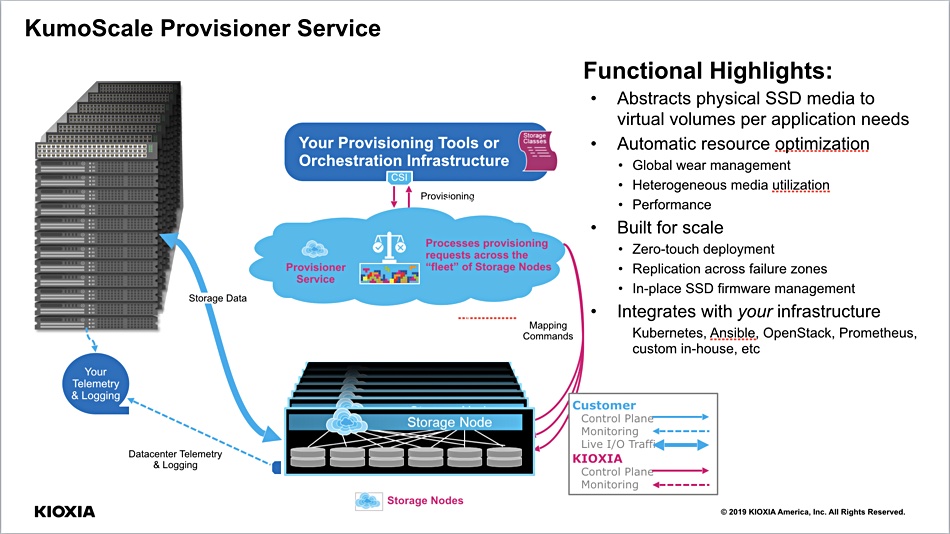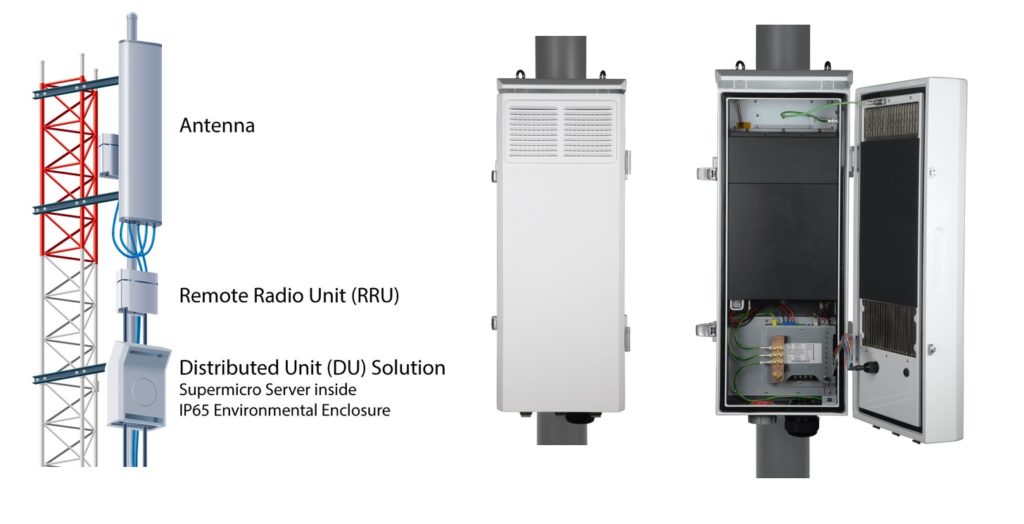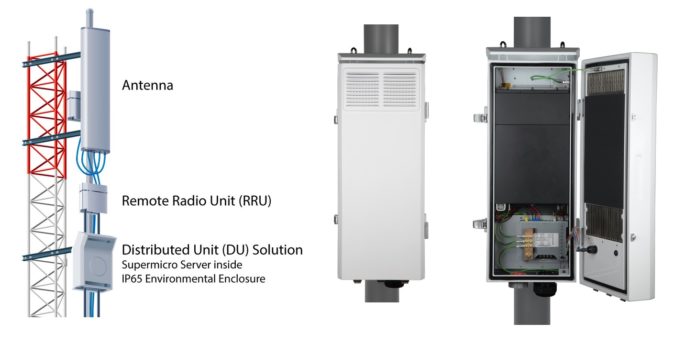5G and edge computing are opening up fresh horizons for servers and storage to provide real time processing with machine learning attributes. Supermicro is on the case, while Kioxia wants to provision flash better for Kubernetes workloads,
These two stories lead this week’s enterprise storage news roundup with more items from IBM, Micron, and VAST Data.
Kioxia improves Kumoscale provisioning
Kioxia has improved the use of flash drives in its Kumoscale all-flash NVMe-oF array software, with a distributed provisioner service for mapping host accesses across nodes and drives.

Kumoscale sits in front of a box of SSDs and presents them as an NVMe-over-Fabrics accessed resource. Host applications perform block IO to flash volumes and the Kumoscale software maps these volumes to individual flash drives and so enables the IOs to complete.
The software has REST API links to storage provisioning and orchestration frameworks such as Kubernetes, OpenStack, Intel RSD and Portworx. Kioxia presents Kumoscale as a Flash-as-a-Service.
Kumoscale acts as a gateway to SDDs packaged in one or more Kumoscale nodes. Its Provisioner Service tracks the fleet of SSDs and storage nodes and manages the dynamic mapping of user volumes to nodes and physical drives. It processes provisioning requests, selecting the best KumoScale node, choosing the SSD and how to map it, and creates the volume via the REST API.
Supermicro goes to the poles
Supermicro has introduced the IP65, a utility pole-mounted server with flash storage, for use in harsh environments. The edge computing device includes a SuperServer with Intel second generation Xeon or Xeon D processors and three PCIe slots for for GPU cards and FPGA accelerators.

Configurations and storage options include 2-inch SSDs, M.2. format flash cards and EDSFF (ruler format) drives.
The systems support the 5G Open Radio Access Network (O-RAN) standard. There are O-RAN architectures which supports cloud-native (containerised) software, such as Red Hat’s 5GC Architecture on Kubernetes. Supermicro is a member of the O-RAN Alliance and supports cloud-native Internet edge computing.
The IP65 systems can function as edge concentrators, taking in sensor/device-generated information and processing it for local real-time decision-making. This could involved local AI-type software, such as machine learning, hence the GPU support.
Locally-generated data – from video surveillance cameras, for example – can also be stored and periodically uploaded to a central data centre. Content can also be distributed from a central site to IP65 boxes for onwards local distribution.
Possible customers are telcos and other utility operators implementing 5G networks. They can manage the IP65 systems remotely and roll out server node 5G networks with virtually zero real estate.
Shorts
Australian wealth manager HUB24 is using copy data manager Actifio to improve its application development. HUB24 uses Actifio’s Virtual Data Pipeline to provide database copies quickly to developers, in minutes compared to days before, with personally identifiable information masked out.
Chris Degnan, Chief Revenue Officer at Snowflake Computing, has joined Clumio’s board
Data protector Code42 has improved its functionality serving to prevent data loss through insider threat. It can now pinpoint suspicious data activity among high-risk employees, including flight risks, contractors, and poor performers. The software detects high-risk data events taking place outside of an employee’s typical hours and prioritises user behaviour that needs investigation.
Cloud-based data protection as a Service startup Clumio says it’s protecting more than 8PB of customer data.
Open source data lake software shipper Databricks has announced a network of partners for data ingest – Fivetran, Qlik, Infoworks, StreamSets, Syncsort – with built-in integrations to Databricks Ingest for automated data loading.
Magneto-resistive RAM developer Everspin Technologies has developed a Spin Transfer Torque (STT) MRAM chip for industrial and IoT applications. It has 8MB to 256MB densities, unlimited endurance and SRAM-like performance, low latency and high bandwidth. This IoT STT-MRAM is compatible with Everspin’s existing Serial Toggle MRAM for which there are more than 1,000 customers.
Hitachi Vantara Federal has recruited two new sales directors to grow its federal business: Tim Angelos (ex-MicroFocus) and Troy Grubbs (ex-HPE.).
IBM has published a Red Book detailing HIPAA Compliance for Healthcare Workloads on IBM Spectrum Scale.
IBM has pointed our attention to a set of Kubernetes Container Storage Interface (CSI) drivers on Git Hub covering IBM”s FlashSystem, Spectrum Scale, Spectrum Virtualize and Storwize. The set also includes CSI drivers for CephFS, OpenStack Cinder, Datera, Dell EMC’s Isilon and PowerMax and many, many more suppliers’ systems.
Kioxia has started sampling UFS (Universal Flash Storage) v3.1 embedded flash memory devices. They use 64-layer 3D NAND in four capacities: 128GB, 256GB, 512GB, and 1TB.
Micron and Continental (tyres, braking, powertrains, etc.) are to enter into a collaboration agreement to explore and adapt Micron’s deep learning accelerator for next-generation machine learning automotive applications. Continental envisions deploying deep learning solutions in areas such as ADAS advanced development, in-cabin monitoring and other connected and autonomous mobility solutions.
Cloud storage gateway and file sharer Nasuni increased revenues in the year ending Dec 31, 2019, 44 per cent over the prior year. Nasuni has enjoyed 23 consecutive quarters of growth. It has about 500 enterprise customers, protecting and providing global access to more than 79 petabytes of data across billions of files in 8,000 locations across 70 countries.
European public cloud service provider Scaleway has a new block storage offering. It features SSD storage and guarantees 5,000 IOPS. Capacity goes up to 10TB and there is a 99.99 per cent availability service-level agreement. Pricing is from €0.08/GB/month for 5,000 IOPS, with no transfer fees and performance, Scaleway claims, among the highest on the market. A second offering at €0.12/GB/month for 10,000 IOPS is expected soon.
Stellus claims its all-flash Data Platform, featuring Key-Value store access over Fabrics, has set a new industry record for single-client data throughput. The previous record for the maximum performance of a single Linux-based NFS client was 22GB/s. Stellus demonstrated 33.2GB/sec bandwidth using a Stellus cluster in a single namespace.
VAST Data, which supplies a single tier QLC (4bits/cell) all flash array, for multi-tier workloads, announced a major US telco is using its kit for Splunk analytics. The array, with a Cold.Storage architecture for Splunk clusters, will ingest up to 1PB/day of data and enable its rapid search. VAST’s data reduction reduces all replicated Splunk buckets down to a single instance of storage and Index servers can be scaled independently of storage capacity.
Yugabyte, which supplies an open source distributed database, hA announced general availability of v2.1 of its YugavyteDB. This features two data center (2DC) deployments for reducing write latency, read replicas for reducing read latency, enterprise-grade encryption enhancements and TPC-C and YCSB benchmarks confirming a 10x increase in performance.
Zadara, which rents out its storage arrays for on-premises use, supports Veeam’s new backup immutability feature, S3 Object Lock, in Veeam Backup & Replication v10.








